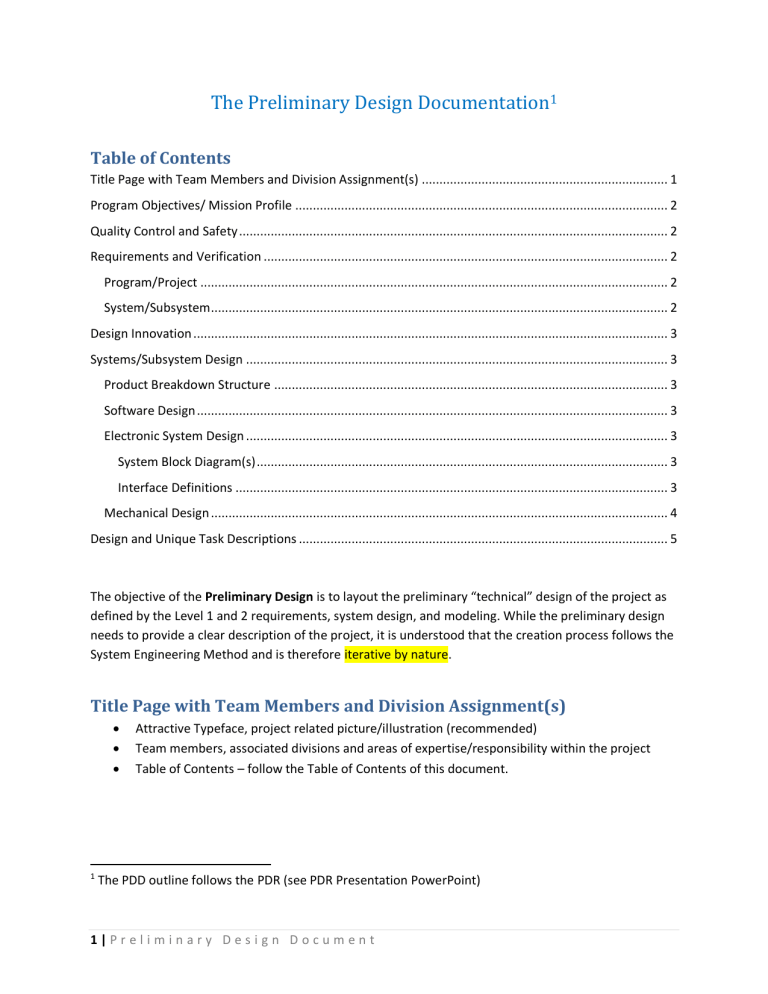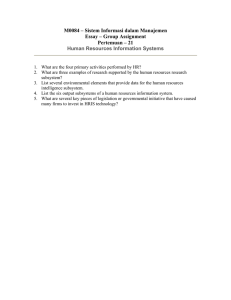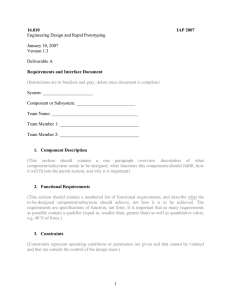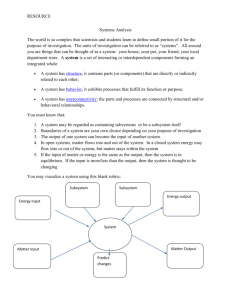
The Preliminary Design Documentation1 Table of Contents Title Page with Team Members and Division Assignment(s) ...................................................................... 1 Program Objectives/ Mission Profile .......................................................................................................... 2 Quality Control and Safety .......................................................................................................................... 2 Requirements and Verification ................................................................................................................... 2 Program/Project ..................................................................................................................................... 2 System/Subsystem .................................................................................................................................. 2 Design Innovation ....................................................................................................................................... 3 Systems/Subsystem Design ........................................................................................................................ 3 Product Breakdown Structure ................................................................................................................ 3 Software Design ...................................................................................................................................... 3 Electronic System Design ........................................................................................................................ 3 System Block Diagram(s) ..................................................................................................................... 3 Interface Definitions ........................................................................................................................... 3 Mechanical Design .................................................................................................................................. 4 Design and Unique Task Descriptions ......................................................................................................... 5 The objective of the Preliminary Design is to layout the preliminary “technical” design of the project as defined by the Level 1 and 2 requirements, system design, and modeling. While the preliminary design needs to provide a clear description of the project, it is understood that the creation process follows the System Engineering Method and is therefore iterative by nature. Title Page with Team Members and Division Assignment(s) 1 Attractive Typeface, project related picture/illustration (recommended) Team members, associated divisions and areas of expertise/responsibility within the project Table of Contents – follow the Table of Contents of this document. The PDD outline follows the PDR (see PDR Presentation PowerPoint) 1|Pr eliminary Des ign Document Program Objectives/ Mission Profile By Project Manager The process begins with the identification of the problem to be solved, and/or product to be built as defined by the customer and codified by the Program Objective Statement. Although the Program Objective may be in the form of a requirement, it is typically a qualitative statement of what the customer wants. These objectives “objectives” are not developed in isolation or at a fixed point in time but like all elements of the engineering method, evolve over the life of the project. For example, after a system design is selected and the manufacturing element of the project comes to the fore, you may need to ask the customer about how easily the widget needs to be put together or taken apart for repair. The answer may require a redrafting of the program objectives, program requirements, system/subsystem requirements, and associated verification tests. The Mission Profile documents how the product will be operated by the customer (ConOps). For many of our robots the Mission Profile is defined by the course it will run on the day of the Final. Definition of requirement verification and validation is not covered in the Preliminary Project Plan. Quality Control and Safety Present Constraints on the project imposed by The Robot Company and Project Stakeholders. Specifically include company (i.e., University) safety standards and those safety standards associated with the product (e.g., Children’s Toys). Requirements and Verification From the mission objectives statement, Program Requirements are written. Often the simple (only by appearance) process of defining a program requirement, will require rethinking program objectives and introduce new calculations that need to be performed, trade-off studies to be conducted, new models / prototypes that will need to be built, and experiments to be conducted. In other words each step in the engineering design process sends ripples both up and down the project. Each Requirements should be numbered for later reference. While each project requirement must be paired with one or more verification tests, this second step will be implemented in the next iteration of this document. Program/Project By Project Manager Clear linkage to Program Objectives and Mission Profile System/Subsystem By System, Subsystem Engineers 2|Pr eliminary Des ign Document Once a system design is selected, the subsystems are defined. Definition of the subsystems is in the form of Subsystem Requirements and Design Specifications. Like the layers of requirements preceding them, each requirement level (program, project, system, subsystem), must be responsive to higher level requirement(s). They may never stand alone. Design Innovation Once a first draft of the program/project requirements is done, the project team searches for creative design solutions (design ideas)2. From these creative solutions (design idea) the project moves to Preliminary Designs3. Consideration of these Preliminary Designs now drives the Engineering Engine, manifested as Project Plans and Reports. Systems/Subsystem Design By System Engineer Pictures and table must always be accompanied by explanatory text. Product Breakdown Structure The major subsystems comprising the system are defined in the Product Breakdown Structure (PBS). Software Design As of this writing software design is being deferred to a later iteration of this document. Electronic System Design System Block Diagram(s) Another aspect of the system design is the clear definition of the subsystems and the interfaces that exist between them. From an electrical engineering perspective, this definition is predicated by the System Block Diagram, followed by a description of the subsystems, their interfaces and requirements. Interface Definitions For a microcontroller based design. The electronic interface definition begins with the Interface Matrix and is finally documented by detailed schematic(s). Often the breadboard testing is documented by Fritzing diagrams. 2 To draft the program/project requirements you have most likely already developed a candidate set of design solutions, if only in your mind – again the Engineering Method is iterative. 3 Please reread this document. 3|Pr eliminary Des ign Document Mechanical Design From a mechanical engineering perspective, the system design is predicated by a 3D mechanical rendering of the system with subassemblies clearly identified. This is typically done with an Exploded View of the system, followed by a description of the subsystems, their interfaces and requirements. 4|Pr eliminary Des ign Document Design and Unique Task Descriptions By Subsystem Engineers After a first pass through the Engineering Process you should have a fairly complete set of Task Definitions. These definitions include a short description of each task that needs to be performed, and its duration. Once these tasks are defined the projects take them to the divisions where engineers are assigned to complete them across the division. For example, if multiple projects need to know more about the characteristics of a servo, then only one engineer need be assigned to gathering information, define a test plan and the conduct and document the test results. This section includes subsystem descriptions and associated task descriptions. When describing the “Design Process” for each major subsystem please include applicable sketches, back of the envelope, trade-off studies, models… Trade-off studies must begin and end with requirements that are the key factors in making a choice. Trade-off studies must be quantitative. Avoid words like: Typically small, Large Torque, Very accurate and precise, Highly efficient, Has reserve power and torque, more likely to malfunction if subjected to overload, precise positioning, stable, quick starting and stopping, small step distance, it’s possible to “skip” steps with high loads, draws maximum current constantly, low self-discharge, very high energy density, A little expensive, high shelf life Do not simply copy-paste material from previous generations of documents. As you work on your Preliminary Design Document, review all the material in the Documentation Guidelines on the class website. 5|Pr eliminary Des ign Document





